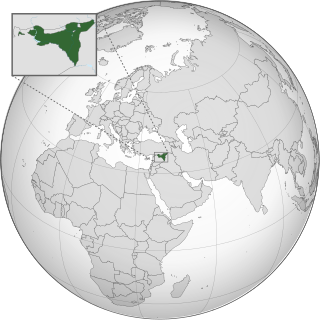
The Kurdish population of Syria is the country's largest ethnic minority, usually estimated at around 10% of the Syrian population and 5% of the Kurdish population.
Amuda is a town in Al Hasakah Governorate in northeastern Syria close to the Syria–Turkey border. As a result of the ongoing civil war, Amuda is currently under the civil control of the AANES and military control of the SDF.

The Democratic Union Party is a Kurdish left-wing political party established on 20 September 2003 in northern Syria. It is a founding member of the National Coordination Body for Democratic Change. It is the leading political party among Syrian Kurds. The PYD was established as a Syrian branch of the Kurdistan Workers Party (PKK) in 2003, and both organizations are still closely affiliated through the Kurdistan Communities Union (KCK).

The Democratic Autonomous Administration of North and East Syria (DAANES), also known as Rojava, is a de facto autonomous region in northeastern Syria. It consists of self-governing sub-regions in the areas of Jazira, Euphrates, Raqqa, Tabqa, and Deir Ez-Zor. The region gained its de facto autonomy in 2012 in the context of the ongoing Rojava conflict and the wider Syrian civil war, in which its official military force, the Syrian Democratic Forces (SDF), has taken part.
Al-Qahtaniyah, formerly Qubur al-Bid, is a town in northeastern Al-Hasakah Governorate, northeastern Syria. It is the administrative center of al-Qahtaniyah Subdistrict, which consists of 103 localities. Historically an Assyrian city, at the 2004 census, it had a population of 16,946. The Female Protection Forces of the Land Between Two Rivers trained in this city.

The Kurdish Front is a predominantly Kurdish Syrian rebel faction participating in the Syrian Civil War.

The Jazira Region, formerly Jazira Canton, is the largest of the three original regions of the de facto Autonomous Administration of North and East Syria (AANES). As part of the ongoing Rojava conflict, its democratic autonomy was officially declared on 21 January 2014. The region is in the Al-Hasakah Governorate of Syria.

A number of different symbols have been used to represent the Democratic Autonomous Administration of North and East Syria (DAANES), commonly known as Rojava. The Autonomous Adminisrtation adopted an official emblem in December 2018. The emblem consists of the words "Autonomous Administration" in Arabic, surrounded by seven red stars representing the regions of northeast Syria, as well as a branch of olives and spike of wheat, two crops grown in the region. Surrounding all of the symbols is the words "Autonomous Administration of North and East Syria" written in Arabic, Kurmanji, Syriac, and Turkish, the languages spoken in the region. The blue and yellow semicircles the whole emblem is put upon represents the Euphrates river and the "permanent spring" of the region. A flag with the Autonomous Administration's emblem on a white field is also used occasionally to represent the Administration itself.

The foreign relations of Rojava are the external relations of the Autonomous Administration of North and East Syria (AANES). The AANES, consisting of three regions, was formed in early 2014 in the context of the Syrian Civil War, a conflict that has caused the involvement of many countries and international organizations in the area.

AANES–Ba'athist Syria relations concern the military and political relations between the Ba'athist Syrian Arab Republic and the Autonomous Administration of North and East Syria (AANES), a de facto autonomous multi-ethnic region in northern and eastern Syria. The Syrian Ba'athist government did not officially recognise the autonomy of the AANES, and advocated a centralist approach to the governance of Syria. The NES seeks the federalisation of Syria. For most of the Syrian civil war, there was a non-aggression pact between the military of Syria and the Syrian Democratic Forces, with occasional confrontations and some cooperation against Islamist groups, in particular against the Turkish Armed Forces and the Turkish-backed Syrian National Army. While the two sides co-operated militarily under Russian supervision since 2019, with Syrian and Russian troops stationed along the Turkish border to prevent further advances, political negotiations ended in failure. The Assad regime had no authority or institutions in North and East Syria outside of its two security boxes in Qamishli/Qamislo and Al-Hasakah/Heseke. The Autonomous Administration did not allow the Syrian Government to hold elections in areas under its control.

The Syrian Democratic Council (SDC) is the political wing of the Syrian Democratic Forces in the Autonomous Administration of North and East Syria (AANES). The SDC's stated mission is working towards the implementation of a "Pluralistic, democratic and decentralized system for all of Syria".

The Syrian Democratic Forces (SDF) has many military councils for local security and defense, each being accountable to the civil council of the area they operate in.

The Federal Executive Council or simply the Executive Council of the Autonomous Administration of North and East Syria, acts as a joint coordination committee that oversees the implementation of policies developed by the Federal Assembly of the Syrian Democratic Council.

The Kurdish National Alliance in Syria is a Syrian Kurdish coalition formed by five Syrian Kurdish parties in the city of Amuda in the al-Hasakah Governorate of northeastern Syria in 13 February 2016. Four of the five parties in the coalition were originally members of the Kurdish National Council, but were expelled due to their cooperation with the Democratic Union Party (PYD).

Hawar News Agency is a news agency. The site started as an Arabic-only news service. Hawar News is linked to the Autonomous Administration of North and East Syria (AANES) and its armed forces the Syrian Democratic Forces (SDF).
Ronahî TV is a Kurdish television channel focusing on Kurds around the world. The channel was launched in 2012 and broadcasts from EU countries and Syria. Its headquarters are in Qamishli.

The first local elections in the Democratic Federation of Northern Syria were held on 22 September 2017. Representatives of 3,700 communes in the regions of the Northern Syria Federation were selected in the election, involving 12,421 candidates. The communal elections on 22 September were followed by elections of local councils in December and a federal parliamentary election of the People's Democratic Council, the region's highest governing body, in 2018. Some areas controlled by the Syrian Democratic Forces were not included in the election, including the city of Manbij.

The Azadî Battalion, also known as the Elite Battalion, is a Kurdish unit affiliated with the Free Syrian Army and reportedly loyal to Mustafa Cumma's Kurdish Freedom Party. Founded in 2012 and led by Azad Shabo, the Azadî Battalion is opposed to the Democratic Union Party (PYD) and fights on the side of Turkey in the Syrian Civil War.
Nuri Mahmoud is a former politician of the Kurdish National Council (ENKS) and Democratic Union Party (PYD) and current military officer and speaker of the Peoples' Defense Units (YPG).

The 2024 Rojava local elections were set to be held on 8 August 2024. Seats and co-mayorships for 134 municipalities within the Autonomous Administration of North and East Syria (AANES)'s seven regions were to be contested by 5,336 candidates.













